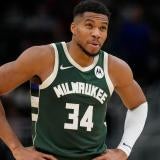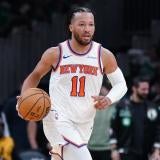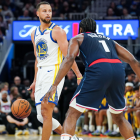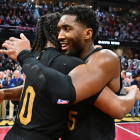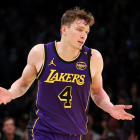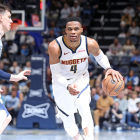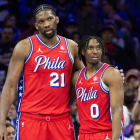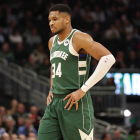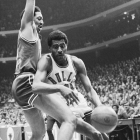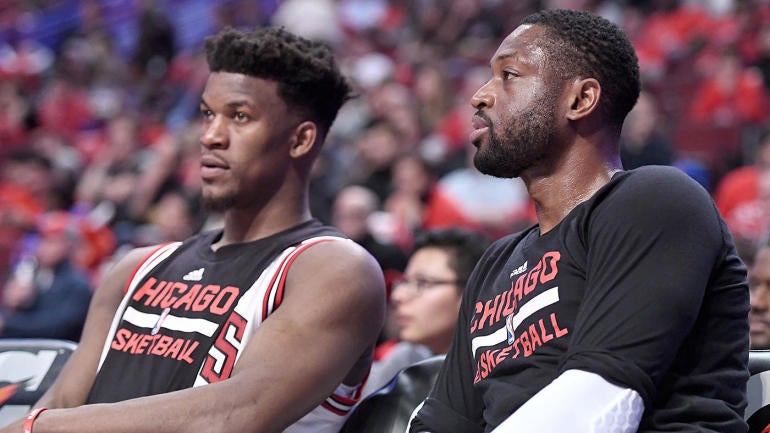
The Los Angeles Lakers were built with intent. It took them a decade, but the plan never changed. Hoard cap space. Stockpile young players. Acquire superstars. It's a blueprint few teams ever have the patience or the means to execute. If every team could wave a wand and land LeBron James and Anthony Davis, it would, but the bulk of the NBA has to take a more complicated route to contention.
James left the Miami Heat in 2014 free agency, and it took them a while to rebound from such a devastating loss. Without LeBron, free agents lost interest. Bad contracts piled up. Draft picks were scarce; young talent was nonexistent. Only four years after building a champion the Lakers way, the Heat became scavengers. A Duncan Robinson here, a Kendrick Nunn there ... these sorts of moves add up over time, but they don't exist in a vacuum.
The true lesson of Miami's rise is the value of opportunism. Whereas most teams spend years planning for a single moment, the Heat quietly collected misfit toys to form a greater whole. Sometimes it was a mistake made by an opponent. Sometimes it was a mistake of their own. And sometimes, it was just plain luck. Yet almost every major player acquisition the Heat have made since LeBron left comes with a story behind it. These are the moments behind the moves, the opportunities that the Heat seized to build their patchwork finalist.
July 11, 2014: Isaiah Thomas signs with Phoenix
Ever heard the expression, "If you have two quarterbacks, you really have none?" Turns out, the number for point guards is three. The 2013-14 Phoenix Suns were a feel-good story, turning an expected year of tanking into 48 wins and a near-playoff berth behind their innovative two-point guard lineup. Eric Bledsoe got a fat contract. Goran Dragic earned third-team All-NBA honors. All was well in Phoenix ... until the Suns decided to double down. Rather than supplementing their point guards with defense, the Suns added a third to the fray: Isaiah Thomas.
Dragic was miserable, and it showed in the standings. With the Suns out of the playoff picture and his free agency looming, Dragic asked for a deal. The market was limited for an All-NBA player. Suitors were scared off by his expiring contract. The Heat weren't. They trusted their ability to recruit a star player from within and dealt two first-round picks (a relative pittance for an All-NBA player considering Paul George just went for five) for Dragic. They re-signed him a few months later. Core piece No. 1: intact.
July 4, 2016: Kevin Durant signs with Warriors
The Heat entered the 2016 offseason intent on signing Durant themselves. They had a viable case. Dragic was locked in. Hassan Whiteside soon joined him. Miami had already taken LeBron to the promised land. No other suitor had ever done the same for a star free agent, but Durant settled on the team James had just beaten: the Golden State Warriors. And, just as James once endured in MIami, Durant became an object of ridicule among fans who felt he'd taken the easy way out.
How much that bothered him, we'll never truly know, but what we can say is this: All-NBA free agents practically never ditch their chosen homes after only three seasons. Even LeBron stuck around for four. But with two championships under his belt and a perceived desire to prove he could win without Golden State's support, Durant left the Warriors for the Nets. For Miami's sake, it had to be the Nets. Why?
D'Angelo Russell. Golden State was able to secure a valuable young asset in return for Durant that no other team could have provided. The problem was, acquiring him meant hard-capping themselves at the apron. That meant jettisoning some cap ballast. So the Warriors dumped Andre Iguodala on Memphis. He refused to play for the Grizzlies, but was on board with the Heat once a contract extension was offered. Fellow Memphis imports Jae Crowder and Solomon Hill have also provided varying degrees of value to the Heat, but make no mistake, Iguodala was the deal's headliner in their mind. After all, Crowder and Hill were nearly forwarded to Oklahoma City for Danilo Gallinari. Miami only gives up Justise Winslow if Iguodala is involved, and Iguodala is only involved, strangely enough, because it was his former Warriors team rather than the Heat that landed Durant in 2016. Even when Pat Riley loses, he wins. Remember that for 2016's other defining moment.
July 15, 2016: Dwyane Wade signs with Bulls
Both Riley and Wade have expressed regret over what happened in the summer of 2016. The Heat, still recovering from Durant's decision to join the Warriors, low-balled Wade to such a degree that he left for the Chicago Bulls. He would ultimately return to Miami in 2018 and finish his career there. It's a chapter in Heat history all sides would rather forget. It is also the most important decision the Heat have made since LeBron left. The Heat would not be back in the NBA Finals if Wade hadn't played for the Bulls.
While there, he bonded with Chicago's incumbent superstar, Jimmy Butler. The two were together when Butler learned he'd been traded to Minnesota, kick-starting the odyssey that would lead him into 2019 free agency without an obvious home. That lone season in Chicago included, according to ESPN's Zach Lowe, Wade's lament at not having appreciated the Heat's culture enough while he was there. Butler took those comments to heart. The Heat tried to trade for Butler in 2018 and ultimately landed him a year later based on nothing but the credit their front office earned over the course of Wade's career. It's hard to imagine them pulling off such a feat with no cap space or All-Star teammates to offer without his influence.
But subtly, Wade is just as responsible for Miami finding its other All-Star. Without him, the Heat shifted gears. After years of devoting roster spots only to veterans that could immediately contribute, their focus shifted toward player-development. This paid dividends later, when players like Duncan Robinson and Kendrick Nunn were given space to grow into valuable contributors, but in the short-term, it pushed Miami to the bottom of the standings as high-risk projects like Dion Waiters and James Johnson sputtered. It took the Heat half a season, but after starting 10-31, the 2016-17 Heat reached .500 with a 31-10 record in the second half of the season. Most teams that play that well across 41 games make it into the playoffs. The Heat didn't. They were kept out by, you guessed it, Wade. The Bulls finished with an identical 41-41 record, but earned the No. 8 seed on a tiebreaker.
Why does this matter? Because missing the playoffs gave the Heat the No. 14 overall pick in the 2017 NBA Draft. They used that pick on Bam Adebayo. Chicago's pick at No. 16 was, ironically, included in the deal that sent Butler to Minnesota. The Timberwolves used that pick on a big man ... Justin Patton. Would they have used that pick on Adebayo instead if Miami and Chicago's slots were reversed? It's unknowable, and a testament to the role luck plays in team-building. The Heat fought desperately to make the playoffs. A tiebreaker kept them out, but gave them one of the greatest consolation prizes in draft history. The Heat were wise enough to identify that gift. The 13 teams ahead of them were not.
July 4, 2017: Gordon Hayward signs with Boston Celtics
Another Heat free agency miss. Miami was the first team to meet with Hayward when 2017 free agency began, but lost him to the very Boston team they just defeated in the Eastern Conference finals. Right now, that probably feels like a dodged bullet, especially since one of their key reserves was only available because Hayward chose the Celtics. In order to create the cap space to sign him, Boston had to renounce its rights to Kelly Olynyk, making him an unrestricted free agent. The Heat, sitting on the cap space they had earmarked for Hayward, sprung into action and quickly offered Olynyk a four-year, $50 million contract. They managed to make that offer without losing breakout role players Waiters, Johnson or Wayne Ellington.
They pulled that off, thanks to the cap wizardry of Andy Elisburg. That summer, he used a little-known cap trick to eek out enough space to sign all four: unlikely incentives. Bonuses in player contracts only count against the cap if the conditions in question were met in the previous season, so Elisburg structured the deals to include bonuses that did not technically meet that description, but were still likely in practice.
As an example: Olynyk's deal included a $1 million bonus reliant on him playing 1,700 minutes. Technically, that was unlikely, as he had never even reached 1,600 in Boston, but Miami promised him a role that would include that sort of playing time, and sure enough, he played 1,779 minutes in his first season with the Heat. So long as the last contract a team signs with this trick fits under the cap with the bonus amount included, there is no limit to the number of players this tactic can be used to fit under the cap (though only 15 percent of a player's salary can be derived from bonuses). Brooklyn copied this strategy to fit DeAndre Jordan under their cap last summer. It's become one of the most commonly abused loopholes in the entire CBA.
This might not seem important, but remember, Waiters and Johnson were the cap ballast necessary to get back Iguodala, Crowder and Hill at the deadline. Olynyk's role may be inconsistent, but he was pivotal in two close second-round wins over the Milwaukee Bucks. His ability to space the floor as a center compromised Milwaukee's rim protection. The Heat outscored the Bucks by 28 points with Olynyk on the floor in that series, and only six points in the minutes he didn't. Miami relies on specialists. Olynyk is a valuable one.
Feb. 8, 2019: Heat blow a 17-point lead
The 2020 Heat are one of the great fourth-quarter teams in recent history. They've outscored their playoff opponents by 68 points in the final frame across the first the first three rounds, yet it was a colossal fourth-quarter choke job a season ago that ultimately landed them the final piece of their puzzle. On the second game of a two-week swing across the Western Conference, the Heat led the Sacramento Kings by as many as 17 points in the second half. The Kings responded by trouncing them 27-13 in the fourth.
Fast-forward to April. The Heat, Kings and Charlotte Hornets are all tied with records of 39-43, so coin flips are used to assign their slots in the NBA Draft lottery. The Kings, who owe their pick to the Boston Celtics, lose and are stuck at No. 14. Had the Heat finished off that victory in February, Boston picks 12th, ahead of Miami at No. 14 in this scenario. In reality, the Heat landed at No. 13, and selected Tyler Herro. That's who the Celtics were targeting at No. 14. The Eastern Conference finals probably go quite differently if Herro is wearing green and white.
Coin flips are the very definition of luck, but dig through any team's history long enough and you'll find just as much of it. The Heat reached the NBA Finals because they weaponized the opportunities circumstances granted them to accumulate high-level players over the course of several years. It wasn't as deliberate as the Lakers' naked pursuit of superstars, but with the Finals looming, the Heat have a chance to prove that it was just as effective. If this list has taught you anything, it's that when the basketball gods grant the Heat a chance, they usually make the most of it.






